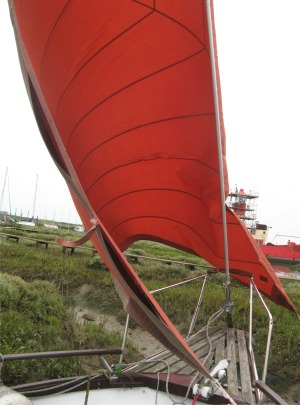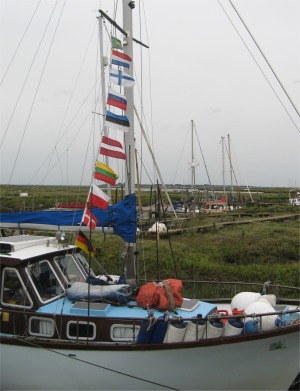We motored down the Elbe estuary and put the sails up around 3am. There was a fickle north wind, and when I took over the watch at 4am, the tide was playing a dominant influence on our track, and being 45� off course our headway was not ideal.
The day continued into night and we continued drifting at a snail pace, but now in the right direction. We soon slipped into an existence of watch/sleep, our paths only crossing at meal times. The boredom was eased during the day when I listened in on Channel 16 to an air-sea rescue operation taking place about 40 miles back up the Elbe estuary.
More light relief from the incessant drift came during a watch-crossover point, when Alan mentioned that he thought something was wrapped around the propeller. His reasoning was due to the possibility that the occasional increase in engine speed during motoring could be due to propeller fouling, and also he could now no longer turn the propeller shaft by hand from between the propeller and gearbox. I volunteered to go overboard and investigate, so we lowered the sails in order to keep the boat stationary in the water, and over I went. For the North Sea, the water was surprisingly clear and warm. I found nothing untoward with the propeller, and I could turn it easily by hand from under the boat. So, back to the drawing board on that one. To make the exercise worth while, I scraped some of the weed off the rudder. We later found the problem to be a leaking water trap under a primary fuel filter.
12th July
During the graveyard watch on a warm and calm evening, I was totally mesmerised by the marine phosphorescence caused by the presence of blooming phytoplankton as it was disturbed. Myriads of pinpoints of light twinkled giving the impression that we were gliding over a velvety, dark sky full of twinkling stars. Later, when we had to motor for a while to charge the batteries, the small bow wave resembled an eerie electric blue neon snaking alongside the boat, quite bright against the inky, black water - enthralling. Darkness gave way to yet another sunny day and a lazy drift with an easterly breeze.
By late afternoon we had picked up a strong north easterly, an ideal wind, but we had to be extremely careful not to accidentally gybe, which could result in serious damage to the boat under such strong wind conditions.
13th July
By the early hours we were skirting around the top of the Frisian Islands, and then cutting west to a set of shipping lanes. The wind had now risen to mid Force 7, generating 2m waves. We reached the shipping lanes as darkness approached. They proved to be exceedingly busy, so much so that we had to work together, one ensuring we didn't accidentally gybe, the other spotting potential gaps between the incessant convoys of ships.
Not long after making our successful dash across the shipping lanes, we came across what at first appeared to be an enormous Christmas tree covered in lights. Close-up inspection revealed it to be a major gas rig. As we sailed past it at what we considered to be a respectable distance, a ship approached us from its direction, alarmingly on a collision course. When it blinded us with a searchlight, Alan called it up over the VHF to ask of its intentions. It stated quite clearly that it intended to keep its course. Alan's response was that we were a yacht under sail and we intended to keep our course. The patrol vessel seemed happy enough with our intentions, and accordingly turned to starboard. A short time after passing the isolated rig, we came across a large Dutch gas field with its accompanying flotilla of supply boats scurrying in and out during the hours of darkness.
Dawn revealed that the genoa, subject to the strong overnight winds, had clouted the searchlight on the boat's pulpit, and dispatched it overboard into the depths.
Our journey continued in rough seas. Cooking was out of the question; our meal was chicken casserole out of self-heating cans - very welcome it was too.
Late afternoon found us motoring across another set of shipping lanes, and once they were crossed, we needed to reef in the genoa since the wind was up; shifted to a north westerly and occasionally reaching Force 8. Reefing in would normally be straightforward, but due to the intensity of the wind, the boat had to be headed straight into the wind in order to perform the reefing. The repercussion of heading directly into the wind was that the sail was suffering heavy flogging, so much so that the genoa developed a hole in it. The reef was established, and we continued on our way.
The wind continued to shift, and coupled with the fact that we were now heading for some treacherous shallows, Alan decided our only option was to motor around them. This necessitated the genoa be taken in completely. Again, Kiitaja was turned into the wind, but such was the ferocity of the wind that when I released the genoa sheet, the wind took the genoa and instantly unreefed the sail at terrific speed. I set about trying to roll the genoa up, but the endless roller mechanism rope would not shift. Carefully picking my way across the heaving deck to the roller reefing mechanism, I soon discovered why it was stuck. It appeared that the genoa had unfurled itself from its previous reef with such force and speed, that the endless roller mechanism rope was yanked back upon itself in the roller mechanism, and the overlap had jammed the rope solid within the mechanism. It was now impossible to roll the genoa in at all.
Once I got this message through to Alan, his experience showed, and he quickly set about forcing the boat to motor in circles, effectively slowly wrapping the genoa around the forestay. It was indeed a slow process, and all the while the genoa was frantically flogging itself, suffering damage in the process. The sheets were whipping about furiously, their ends becoming knotted as they writhed like snakes. The danger now was the knotted ends becoming tangled up around parts of the boat; if the knots got caught up, and a gust took the genoa, the parts caught up could well be ripped off. I gingerly ventured out onto the wildly tossing foredeck to free the sheets when they became snagged, to prevent serious damage occurring. I was painfully aware that if the sheets wrapped around one of my limbs, I could easily lose a limb.
The genoa was starting to suffer badly with the leech beginning to shred itself, and as part of a damage limitation exercise, Alan asked me to cut the genoa sheets off with a bolt cutter. Laying on my side on the foredeck, I waited until I could hook the sheets onto a cleat, and then lying on my back, I managed to sever the sheets. With this accomplished, the slow winding process continued until the genoa was completely wrapped around the forestay. At this stage of the game, I climbed out onto the pitching pulpit, clinging onto the forestay for dear life, and tied the remains of the sheets around the wound up genoa to prevent it unwrapping in the gale.
We had no option now but to motor the final 60 miles to Tollesbury.
14th July
 Damage to the Genoa Leech |
 Collection of the Courtesy Flags of the Countries we Visited |
It was during one of the ferrying trips that I bumped into Paul, who also keeps a yacht on the saltings. He was off to his boat to carry out some repairs. Apparently a few days earlier his boat had been broken into and electrical goods had been stolen. I learned that whilst we were away, an organised gang had been systematically breaking into quite a lot of yachts around the saltings in order to steal marine electronic goods, and Paul's yacht was the latest victim. That was sad news to come back to.
Alan had even sorrier news in the following week. Wranglings over the responsibility for the mooring posts, where Alan kept Kiitaja, and his insurance company's insistence that they would not allow Alan to be responsible for the posts, forced Alan to move from the saltings. He had been happily berthed there for many years, but now he had to move on to a marina near Maldon. It was indeed sad, particularly since he would be leaving the Tollesbury Mud Club crowd that he had been so much a part of over all those years.
